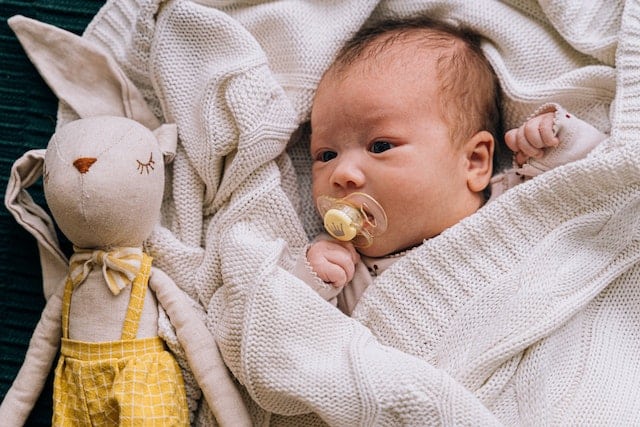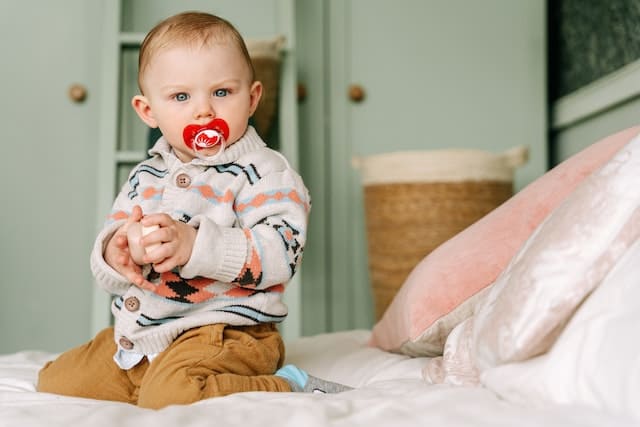Babies use pacifiers as a means of self-soothing, and parents rely on them to keep their little ones calm. However, some babies may gag on pacifiers, which can be a concerning experience for parents. Gagging is a natural reflex that helps protect babies from choking, but it can be alarming to witness.
Understanding why babies gag on pacifiers can help parents prevent and manage this issue. There are several reasons why a baby may gag on a pacifier, including the size and shape of the pacifier, the baby’s oral development, and their individual gag reflex sensitivity. While gagging on a pacifier is usually not a serious issue, it can be uncomfortable for the baby and cause distress for parents.
Key Takeaways
- Gagging on a pacifier is a natural reflex that helps protect babies from choking.
- Several factors can cause a baby to gag on a pacifier, including the size and shape of the pacifier, the baby’s oral development, and their individual gag reflex sensitivity.
- Understanding the causes of gagging on pacifiers can help parents prevent and manage this issue.
Understanding Baby’s Gag Reflex

Babies are born with a gag reflex, which is a protective mechanism designed to prevent choking. This reflex is hyper-sensitive in infants and can be triggered by a variety of stimuli, including pacifiers.
The gag reflex is an automatic response that is controlled by the brainstem. It is a complex reflex that involves the contraction of several muscles in the mouth and throat. When a baby’s gag reflex is triggered, they may cough, gag, or even vomit in an attempt to clear their airway.
During the first few months of life, a baby’s gag reflex is particularly sensitive. This is due to the fact that their brain and nervous system are still developing. As a result, babies may gag more frequently in response to stimuli that would not trigger a gag reflex in an older child or adult.
It is important for parents to understand that gagging is a normal part of a baby’s development. However, if a baby’s gag reflex is hyper-sensitive, it can be challenging to introduce new foods or objects into their mouth. In some cases, babies may even refuse to eat or drink because of their sensitive gag reflex.
Parents can help their baby’s gag reflex develop by introducing new textures and flavors gradually. It is also important to supervise babies closely when they are eating or playing with objects that could potentially trigger their gag reflex.
In summary, the gag reflex is a normal and important protective mechanism in babies. While it can be hyper-sensitive in infants, it is a natural part of their development and can be managed with patience and care.
Causes of Gagging on Pacifiers
Gagging on pacifiers is a common concern among parents. While pacifiers can be a great soothing tool for babies, it is important to understand the potential causes of gagging to ensure your baby’s safety and comfort.
1. Nipple Size and Shape
One of the most common causes of gagging on pacifiers is the size and shape of the nipple. Newborns have a small mouth and may struggle with larger nipples. Additionally, some babies may prefer a specific shape or texture of nipple, and may gag if the pacifier does not meet their preferences.
2. Strong Gag Reflex
Some babies have a strong gag reflex, which can cause them to gag on pacifiers. This can be particularly common in newborns, as their reflexes are still developing.
3. Teething
Teething can also contribute to gagging on pacifiers. As babies begin to teethe, they may experience discomfort and may not want to use a pacifier as frequently.
4. Pacifier Use
Overuse of pacifiers can also cause gagging. If a baby is constantly using a pacifier, they may become accustomed to having it in their mouth and may gag when it is removed.
5. Pacifier Rash
Finally, pacifier rash can also cause gagging. This occurs when a baby has an allergic reaction to the materials in the pacifier, causing a rash around their mouth and nose. This can be uncomfortable and may cause gagging.
Overall, there are several potential causes of gagging on pacifiers. By understanding these causes, parents can take steps to ensure their baby’s comfort and safety when using a pacifier.
Effects of Gagging

Gagging is a common occurrence with babies who use pacifiers. While it may seem like a harmless reflex, it can have some negative effects on the baby’s health. In this section, we will discuss the potential effects of gagging on pacifiers.
1. Choking and Swallowing
Gagging can lead to choking and swallowing issues in babies. If the baby gags on the pacifier and it becomes lodged in their throat, they may have difficulty breathing. This can quickly escalate into a life-threatening emergency. It is important for parents to monitor their baby while they are using a pacifier to prevent choking incidents.
2. Breathing Difficulties
Gagging can also cause breathing difficulties in babies. If the baby gags and inhales the pacifier, it can obstruct their airway and make it difficult for them to breathe. This can lead to oxygen deprivation and other serious health complications.
3. Sudden Infant Death Syndrome (SIDS)
While there is no direct link between gagging on pacifiers and SIDS, it is important to note that pacifiers have been shown to reduce the risk of SIDS. However, if a baby gags on their pacifier and it becomes lodged in their throat, it can increase the risk of suffocation and other breathing-related issues.
4. Infant CPR and Emergency Procedures
Parents should be prepared to administer infant CPR and other emergency procedures if their baby experiences choking or breathing difficulties while using a pacifier. It is important to know the proper techniques for these procedures and to have emergency contact information readily available.
In conclusion, while gagging on pacifiers may seem like a harmless reflex, it can have serious negative effects on a baby’s health. Parents should monitor their baby while they are using a pacifier and be prepared to administer emergency procedures if necessary.
Preventing and Managing Gagging
Gagging is a common reflex in babies, especially when they are still learning how to use a pacifier. It can be a distressing experience for both the baby and the parent. However, there are some steps that parents can take to prevent and manage gagging.
1. Choosing the Right Pacifier
Parents should choose a pacifier that is appropriate for their baby’s age and mouth size. The pacifier should fit comfortably in the baby’s mouth without being too large or too small. It is important to note that different brands and nipple sizes may affect a baby’s ability to use a pacifier, so it may be necessary to try a few different options before finding the right one.
2. Desensitizing the Gag Reflex
Parents can help desensitize their baby’s gag reflex by introducing solid foods gradually and in small amounts. It is also important to avoid forcing a baby to eat or to take a pacifier if they are resisting. Reverse psychology can be an effective technique in encouraging a baby to accept a pacifier.
3. Proper Pacifier Use
Parents should always clean the pacifier before giving it to their baby. It is also important to ensure that the pacifier is not too hot or too cold before giving it to the baby. Additionally, parents should avoid putting the pacifier on a string or ribbon around the baby’s neck, as this can pose a choking hazard.
4. Seeking Medical Attention
If a baby gags frequently or has a sensitive gag reflex, it may be necessary to seek medical attention. A pediatrician can help determine if there are any underlying issues that need to be addressed. It is also important to seek medical attention if a baby gags and has difficulty breathing or if an object becomes lodged in their airway.
In summary, preventing and managing gagging in babies requires proper pacifier use, desensitizing the gag reflex, and seeking medical attention when necessary. By following these steps, parents can help ensure that their baby is safe and comfortable while using a pacifier.
Gagging and Other Feeding Methods

Gagging is a common occurrence in babies, especially during feeding. It is a reflex action that helps protect the airways from choking. Gagging can occur when a baby is breastfeeding, bottle-feeding, or using a pacifier. It is important to understand the causes of gagging and how to prevent it.
Breastfeeding is a natural and healthy way to feed a baby. However, some babies may gag while breastfeeding. This can be due to several reasons, such as an overactive let-down reflex, a shallow latch, or a blocked nose. To prevent gagging, it is important to ensure that the baby is latched on properly and that the nose is clear.
Bottle feeding is another common feeding method. Gagging can occur when the baby is taking in too much milk too quickly, or when the nipple is too large or too small. It is important to choose the right size and shape of the nipple, and to feed the baby slowly and at a comfortable angle.
Pacifiers can also cause gagging in babies. This can be due to the size or shape of the pacifier, or if the baby is not ready for it. It is important to choose the right size and shape of the pacifier, and to introduce it gradually.
Reflux is a condition where the stomach contents flow back into the esophagus. This can cause gagging, spitting up, and discomfort in babies. To prevent reflux, it is important to feed the baby slowly and in an upright position, and to burp the baby frequently.
In conclusion, gagging is a common occurrence in babies during feeding. It can occur during breastfeeding, bottle feeding, and pacifier use. To prevent gagging, it is important to choose the right size and shape of the nipple or pacifier, feed the baby slowly, and ensure that the baby is in a comfortable position. If gagging persists or is accompanied by other symptoms, it is important to consult a healthcare provider.
Related posts:
Frequently Asked Questions
What are some of the best pacifiers for newborns?
There is no one-size-fits-all answer to this question, as every baby is different. However, some popular pacifier brands for newborns include Philips Avent Soothie, NUK Orthodontic, and MAM Newborn Start. It’s important to choose a pacifier that is the appropriate size for your baby’s age and development.
How can I stop my baby from gagging on a pacifier?
If your baby is gagging on a pacifier, it may be too large or too long for their mouth. Try a smaller or shorter pacifier to see if that helps. Additionally, make sure the pacifier is clean and free of any debris or damage that could cause discomfort.
Is it normal for babies to gag when using a pacifier?
It is not uncommon for babies to gag when using a pacifier, especially if they are new to using one. However, if your baby consistently gags or has trouble breathing while using a pacifier, it may be a sign of a larger issue and you should consult with your pediatrician.
Can pacifiers make babies throw up?
While it is rare, a pacifier that is too large or too long for a baby’s mouth can cause them to gag and potentially vomit. It’s important to choose a pacifier that is the appropriate size for your baby’s age and development to avoid this issue.
What causes babies to gag on bottles?
Babies may gag on bottles for a variety of reasons, including a nipple that is too large or too long, a feeding position that is not comfortable for the baby, or an underlying medical issue. Consult with your pediatrician if your baby consistently gags while feeding.
Are Simply Rubber pacifiers a good option for babies who gag?
Simply Rubber pacifiers are made from natural rubber and are free of harmful chemicals, making them a safe and eco-friendly option for babies. However, every baby is different and it’s important to choose a pacifier that is the appropriate size and shape for your baby’s needs.

Iesha is a loving mother of 2 beautiful children. She’s an active parent who enjoys indoor and outdoor adventures with her family. Her mission is to share practical and realistic parenting advice to help the parenting community becoming stronger.
